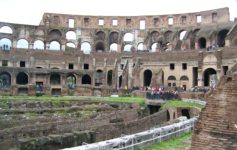This change in length \(\Delta\)L = L − L0 may be either elongation (when \(L\) is larger than the original length \(L_o\)) or contraction (when L is smaller than the original length L0). One way to envision such a situation is illustrated in Figure \(\PageIndex{1}\). The rod is a part of a vertical support that holds a heavy 550-kg platform that hangs attached to the rod’s lower end. The curve start from origin. Mathematically: E= Stress/Strain Young’s Modulus E, is generally assumed to be same in tension or Compression and for most of engineering application has high Numerical value. In the elastic range and for most materials uniaxial tensile and compressive stress-strain curves are identical. Strain is any change in volume or shape.There are four general types of stress. 12.4: Stress, Strain, and Elastic Modulus (Part 1), [ "article:topic", "shear modulus", "stress", "strain", "elastic modulus", "authorname:openstax", "Pressure", "bulk modulus", "bulk strain", "volume strai", "bulk stress", "volume stress", "compressibility", "compressive strain", "compressive stress", "normal pressure", "pascal", "Pa", "shear strain", "shear stress", "tensile strain", "tensile stress", "Young\u2019s modulus", "license:ccby", "showtoc:no", "program:openstax" ], https://phys.libretexts.org/@app/auth/2/login?returnto=https%3A%2F%2Fphys.libretexts.org%2FBookshelves%2FUniversity_Physics%2FBook%253A_University_Physics_(OpenStax)%2FMap%253A_University_Physics_I_-_Mechanics_Sound_Oscillations_and_Waves_(OpenStax)%2F12%253A_Static_Equilibrium_and_Elasticity%2F12.04%253A_Stress%252C_Strain%252C_and_Elastic_Modulus_(Part_1), 12.5: Stress, Strain, and Elastic Modulus (Part 2), Tensile or Compressive Stress, Strain, and Young’s Modulus, Creative Commons Attribution License (by 4.0), Explain the concepts of stress and strain in describing elastic deformations of materials, Describe the types of elastic deformation of objects and materials. In a solid, atoms and molecules are arranged in a way that neighbouring molecules exert a force on each other. The events can be things we see, hear, feel, etc. In the next section, we discuss strain-stress relations beyond the linear limit represented by Equation \ref{12.33}, in the full range of stress values up to a fracture point. • Strain can also be “rotated” to find its principal strain, principal strain direction, and maximum shear strain. Showing thereby that there is no initial stress of strain in the specimen. For example, a stress on a rubber band produces larger strain (deformation) than the same stress on a steel band of the same dimensions because the elastic modulus for rubber is two orders of magnitude smaller than the elastic modulus for steel. Compressive stress and strain are defined by the same formulas, Equations \ref{12.34} and \ref{12.35}, respectively. STRESS-STRAIN CURVES David Roylance Department of Materials Science and Engineering Massachusetts Institute of Technology Cambridge, MA 02139 August 23, 2001 Stresses, however, cannot be directly measured, but stain is On the other hand, a small elastic modulus means that stress produces large strain and noticeable deformation. The quantity that describes this deformation is called strain. The proportionality constant in this relation is called the elastic modulus. �+6���r�{��H�\�# �MI�6�8�_ʥ��:7y�G�C�zS�S�0�������f�b),{�_$�K6�M�~ͫ���`���7;>G�0��D&�X�Z.¹� One example is a long shelf loaded with heavy books that sags between the end supports under the weight of the books. The extent to which an object can be perceived as rigid depends on the physical properties of the material from which it is made. The elastic modulus for tensile stress is called Young’s modulus; that for the bulk stress is called the bulk modulus; and that for shear stress is called the shear modulus. a. Stress and Strain Curves or Diagram: This curve is a behavior of the material when it is subjected to load. Ignoring the weight of the rod, what is the tensile stress in the rod and the elongation of the rod under the stress? Unless otherwise noted, LibreTexts content is licensed by CC BY-NC-SA 3.0. Stress Units Types of Stress Summary Questions �$N��Fn���8�����ncm������K4K�ƣ�?����'O?v��7���O9,����ʼb Once we have the normal force, we use Equation 12.34 to find the stress. From the perspective of loading, stress is the applied force or system of forces that tends to deform a body. View this demonstration to move the box to see how the compression (or tension) in the columns is affected when the box changes its position. simple stress is defined as the internal resistance force that opposes the external force per unit area.Tensile Stresses, Compressive Stresses, Shear Stresses, Bending Stresses, Torsion Stresses. 1. So today we will learn about types of strain. Example \(\PageIndex{2}\): Stretching a Rod. The stress-strain diagram is of immense help in conveying information about mechanical properties and behaviour of the material. 3.3 or 3.7. Ԧ{�a#�H���n��@�a2�S!�$3�� The symbol F\(\perp\) that we reserve for the deforming force means that this force acts perpendicularly to the cross-section of the object. Concepts of Stress and Strain One of our principal concerns in this course is material behavior (Strength). The tangential stress is also called as Shearing Stress. %PDF-1.3 When one newton of force presses on a unit surface area of one meter squared, the resulting stress is one pascal: \[one\; pascal = 1.0\; Pa = \frac{1.0\; N}{1.0\; m^{2}} \ldotp\], In the British system of units, the unit of stress is ‘psi,’ which stands for ‘pound per square inch’ (lb/in2). For example, a ping-pong ball made of plastic is brittle, and a tennis ball made of rubber is elastic when acted upon by squashing forces. TYPES OF STRAIN. Hooke’s law holds up to a maximum stress called the proportional limit. In the language of physics, two terms describe the forces on objects undergoing deformation: stress and strain. But when we stretch a body, its dimensions changes in all directions. 13 ! Engineering Stress-Strain Curve. Thus, we need to be able to compute stresses. Page- 1. Ductile Material: Ductile materials are materials that can be plastically twisted with no crack. In such a case, when deforming forces act tangentially to the object’s surface, we call them ‘shear’ forces and the stress they cause is called shear stress. Even very small forces are known to cause some deformation. This type of stress often gets called acute stress. In either of these situations, we define stress as the ratio of the deforming force \(F_{\perp}\) to the cross-sectional area A of the object being deformed. They are: Tensile Stress: It is the force applied per unit area which results in the increase in length (or area) of a body. The volume of the pillar segment with height h = 3.0 m and cross-sectional area A = 0.20 m2 is, \[V = Ah = (0.20\; m^{2})(3.0\; m) = 0.60\; m^{3} \ldotp\], With the density of granite \(\rho\) = 2.7 x 103 kg/m3, the mass of the pillar segment is, \[m = \rho V = (2.7 \times 10^{3}\; kg/m^{3})(0.60\; m^{3}) = 1.60 \times 10^{3}\; kg \ldotp\], \[w_{p} = mg = (1.60 \times 10^{3}\; kg)(9.80\; m/s^{2}) = 1.568 \times 10^{4}\; N \ldotp\], The weight of the sculpture is ws = 1.0 x 104 N, so the normal force on the cross-sectional surface located 3.0 m below the sculpture is, \[F_{\perp} = w_{p} + w_{s} = (1.568 + 1.0) \times 10^{4}\; N = 2.568 \times 10^{4}\; N \ldotp\], \[stress = \frac{F_{\perp}}{A} = \frac{2.568 \times 10^{4}\; N}{0.20 m^{2}} = 1.284 \times 10^{5}\; Pa = 128.4\; kPa \ldotp\], Young’s modulus for granite is Y = 4.5 x 1010 Pa = 4.5 x 107 kPa. These tables are valuable references for industry and for anyone involved in engineering or construction. The SI unit of stress is the pascal (Pa). The only difference from the tensile situation is that for compressive stress and strain, we take absolute values of the right-hand sides in Equation \ref{12.34} and \ref{12.35}. Stress is generally defined as force per unit area. The strain which is induced due to tensile stress is called tensile strain. The greater the stress, the greater the strain; however, the relation between strain and stress does not need to be linear. << /Length 4 0 R /Filter /FlateDecode >> Substituting numerical values into the equations gives us, \[\begin{split} \frac{F_{\perp}}{A} & = \frac{(550\; kg)(9.8\; m/s^{2})}{3.0 \times 10^{-5}\; m^{2}} = 1.8 \times 10^{8}\; Pa \\ \Delta L & = \frac{F_{\perp}}{A} \frac{L_{0}}{Y} = (1.8 \times 10^{8}\; Pa) \left(\dfrac{2.0\; m}{2.0 \times 10^{11}\; Pa}\right) = 1.8 \times 10^{-3}\; m = 1.8\; mm \ldotp \end{split}\]. There are three types of stress: compression, tension, and shear. MODULUS OF ELASTICITY E Elastic materials always spring back into shape when released. Young’s modulus \(Y\) is the elastic modulus when deformation is caused by either tensile or compressive stress, and is defined by Equation \ref{12.33}. The net effect of such forces is that the rod changes its length from the original length L0 that it had before the forces appeared, to a new length L that it has under the action of the forces. Another unit that is often used for bulk stress is the atm (atmosphere). When forces pull on an object and cause its elongation, like the stretching of an elastic band, we call such stress a tensile stress. In the remainder of this section, we study the linear limit expressed by Equation \ref{12.33}. A heavy box rests on a table supported by three columns. Stress The term stress (s) is used to express the loading in terms of force applied to a certain cross-sectional area of an object. The effect of stress on a body is named as strain. To know the statement and application of Hooke’s law. Strain=Change in. (Answers 152.8 MPa and 120 ) 3. The definition of the tensile stress is, \[tensile\; stress = \frac{F_{\perp}}{A} \ldotp \label{12.34}\], Tensile strain is the measure of the deformation of an object under tensile stress and is defined as the fractional change of the object’s length when the object experiences tensile stress, \[tensile\; strain = \frac{\Delta L}{L_{0}} \ldotp \label{12.35}\]. Rocks only strain when placed under stress… Therefore, the compressive strain at this position is, \[strain = \frac{stress}{Y} = \frac{128.4\; kPa}{4.5 \times 10^{7}\; kPa} = 2.85 \times 10^{-6} \ldotp\]. Compressive stress and strain occur when the forces are contracting an object, causing its shortening, and the length change \(\Delta L\) is negative. Deformation is experienced by objects or physical media under the action of external forces—for example, this may be squashing, squeezing, ripping, twisting, shearing, or pulling the objects apart. ;��H��L!5���. 2 0 obj Stress is a set of physical and psychological reactions to events that challenge or threaten us. For the remainder of this section, we move from consideration of forces that affect the motion of an object to those that affect an object’s shape. The top surface of the shelf is in compressive stress and the bottom surface of the shelf is in tensile stress. The normal force that acts on the cross-section located 3.0 m down from the top is the sum of the pillar’s weight and the sculpture’s weight. For example, when a solid vertical bar is supporting an overhead weight, each particle in the bar pushes on the particles immediately below it. The proportionality constant in this relation is called the elastic modulus. Stress and Strain Theory at a Glance (for IES, GATE, PSU) 1.1 Stress When a material is subjected to an external force, a resisting force is set up within the component. Figure 3‐2 Geometry of normal strain (a) 1D, (b) 2D, and (c) 2D shear strain Stress is a measure of the force per unit area acting on a plane passing through the point of interest in a body. Calculate the stress and strain. If … Legal. Therefore, strain is a dimensionless number. x��][o��u~�_�����_d� $�L�/��#Q��G�X���߇d���:�u���]'��.5yXu�߹Կ��7�j���#������Ƕ���o~��I5WO�����k�Ѷ����D�Mh�6�6A��Qݯ��x�7�����w͏��6�Q����ͻ?5��1�g��o�1���XPڎ+m��ѯ+Z��7lśq�X1ʊ:�i�4����v�"������6���4�f�9��5�v�y�;^��=bZq�� �AO���+b�����H����r%:z�X�$� mɹ��+I�L�xG��m�R��v咒F�?��;!z���5N���'�Q3�!�~NqNj���FyL�&"~��x1��q������h�HCnuQWzb���YR��Ih'�h�0�T:V������Z��v��U!�Yq>!k�&�gA�ڼ�[Ŝ Conversion factors are, \[1\; psi = 6895\; Pa\; and\; 1\; Pa = 1.450 \times 10^{-4}\; psi\], \[1\; atm = 1.013 \times 10^{5}\; Pa = 14.7\; psi \ldotp\]. Therefore, there are 6 independent variables in the strain matrix, instead of 9. Forces that act parallel to the cross-section do not change the length of an object. A model of a rigid body is an idealized example of an object that does not deform under the actions of external forces. Similarly as in the example with the column, the tensile stress in this example is not uniform along the length of the rod. Dividing this equation by tensile strain, we obtain the expression for Young’s modulus: \[Y = \frac{tensile\; stress}{tensile\; strain} = \frac{\frac{F_{\perp}}{A}}{\frac{\Delta L}{L_{0}}} = \frac{F_{\perp}}{A} = \frac{L_{0}}{\Delta L} \ldotp \label{12.36}\], Example \(\PageIndex{1}\): Compressive Stress in a Pillar. It is equals to the ratio of increase in the length to the original length. Have questions or comments? [_>�D_8���)�aJ"����/��׃����"*����@7�w�My^z�>���`:���(��%'�kQ��Ԑ,8��l�=M�m��+��'���B���$ m�,쁘��P�zX �RJ�햜��C���W�6�t�����s]��� We shall restrict ourselves to behaviour of structural steel only. The stress-strain curve depends on two types of material.. 1. Intermolecular Force. The greater the stress, the greater the strain; however, the relation between strain and stress does not need to be linear. %��������� Watch the recordings here on Youtube! Objects under tensile stress become thinner and longer. As we can see from dimensional analysis of this relation, the elastic modulus has the same physical unit as stress because strain is dimensionless. Elastic moduli for various materials are measured under various physical conditions, such as varying temperature, and collected in engineering data tables for reference (Table \(\PageIndex{1}\)). stream In other situations, the acting forces may be neither tensile nor compressive, and still produce a noticeable deformation. Then we invert Equation 12.36 to find the rod’s elongation, using L0 = 2.0 m. From Table 12.1, Young’s modulus for steel is Y = 2.0 x 1011 Pa. Stress can be categorized into three categories depending upon the direction of the deforming forces acting on the body. Stressors, stress and strain -- some basics 1. The LibreTexts libraries are Powered by MindTouch® and are supported by the Department of Education Open Textbook Pilot Project, the UC Davis Office of the Provost, the UC Davis Library, the California State University Affordable Learning Solutions Program, and Merlot. ���k;/j�9�JT��=_�;(t-�"�P~l���"��r������*�U�J��R��m���)I���3 The stress-strain curve diagram for a ductile material like mild steel is shown in figure below. Chapter-1. Among common structural materials, only steel exhibits this type of Let us study them one by one. First we find the weight of the 3.0-m-long top section of the pillar. Dimension \ Original. Samuel J. Ling (Truman State University), Jeff Sanny (Loyola Marymount University), and Bill Moebs with many contributing authors. Note that the relation between stress and strain is an observed relation, measured in the laboratory. For example, suppose you hold a book tightly between the palms of your hands, then with one hand you press-and-pull on the front cover away from you, while with the other hand you press-and-pull on the back cover toward you. We also acknowledge previous National Science Foundation support under grant numbers 1246120, 1525057, and 1413739. An object or medium under stress becomes deformed. Objectives To classify stress into different categories. Tensile stress is a type of normal stress, so it acts at 90 degree to the area. It is very useful when analyzing mechanical systems—and many physical objects are indeed rigid to a great extent. Strain is given as a fractional change in either length (under tensile stress) or volume (under bulk stress) or geometry (under shear stress). We can also see from Equation \ref{12.33} that when an object is characterized by a large value of elastic modulus, the effect of stress is small. A rod segment is either stretched or squeezed by a pair of forces acting along its length and perpendicular to its cross-section. Stress can cause strain, if it is sufficient to overcome the strength of the object that is under stress. Find the compressive stress and strain at the base of Nelson’s column. If has the same units as stress. The stress-strain diagram is shown in figure. 14 One type of stress is uniform, which means the force applies equally on all sides of a body of rock. ���d�� ^B@���8Q�DAX�@ Пt9��� i�e{��1���j�����S~!a�l��b!N�|���u���%�^{?Y�]����*�V��5�O�ve�ͯFk����l�"��%�Xn�! According to the American Psychological Association, the three types of stress — acute stress, episodic acute stress, and chronic stress — can all … A simple Stress and strain are produced due to any of the following type of actions done on the machine parts. and extends by 0.2 mm. Strain is defined as the change in dimension (fractional deformation) produced by the external force of the body. While the word “stress\" connotes a negative impression, acute stress is what actually brings about excitement, joy and thrill in our lives. What is “stress” and strain or toxic stress? The other three types of stress, tension, compression and shear, are non-uniform, or directed, stresses.All rocks in the earth experience a uniform stress at all times. In the linear limit of low stress values, the general relation between stress and strain is, \[stress = (elastic\; modulus) \times strain \ldotp \label{12.33}\]. According to it strain can be divided into two types. STRAIN. Objects can often experience both compressive stress and tensile stress simultaneously Figure \(\PageIndex{3}\). Tensile stress and strain occur when the forces are stretching an object, causing its elongation, and the length change \(\Delta L\) is positive. The specific reactions vary amongst individuals but there are consistent patterns. To find the compressive strain, we find the value of Young’s modulus for granite in Table \(\PageIndex{1}\) and invert Equation \ref{12.36}. Riding a roller coaster in a theme park, for instance, is a situation that brings about acute stress, yet brings excitement. There are many other factors on which we can categorized strain. Calculate the stress and strain. Stress – Strain Relationships Tensile Testing One basic ingredient in the study of the mechanics of deformable bodies is the resistive properties of materials. Typically E=210×10*9 N/m*2 for steel 18. ! Application of stress causes a body of rock to yield or deform. Missed the LibreFest? Thus, if the pillar has a uniform cross-sectional area along its length, the stress is largest at its base. Similarly, someone who designs prosthetic limbs may be able to approximate the mechanics of human limbs by modeling them as rigid bodies; however, the actual combination of bones and tissues is an elastic medium. A rod is 0.5 m long and 5 mm diameter. Stress can deform the body. STRESS AND STRAIN DIAGRAM Compressive Stress: It is the force applied per unit area which results in the decrease in length (or area) of a body. Also Read: Stress Strain Curve – Relationship, Diagram and Explanation A change in shape due to the application of a force is known as a deformation. • Strain is also a symmetric second-order tensor, identical to the stress. Normal Stress: Having derived the proportionality relation for strain, ε x, in the x-direction, the variation of stress, σ x, in the x-direction can be found by substituting σ for ε in Eqs. Only when stress is sufficiently low is the deformation it causes in direct proportion to the stress value. Notice that the normal force acting on the cross-sectional area of the pillar is not constant along its length, but varies from its smallest value at the top to its largest value at the bottom of the pillar. The internal resistance force per unit area acting on a material or intensity of the forces distributed over a given section is called the stress at a point. A 2.0-m-long wire stretches 1.0 mm when subjected to a load. Of all forms of stress, acute stress is the most widely experienced one, since it typically is caused by the daily demands and pressures encountered by each one of us. Dimension. To calculate stress intensities caused by the applied loads in simple and composite sections. The constant is known as Modulus of elasticity or Young’s Modulus or Elastic Modulus. Only when stress is sufficiently low is the deformation it causes in direct proportion to the stress value. In modern building construction, such bending strains can be almost eliminated with the use of I-beams Figure \(\PageIndex{4}\). Here you can download the free lecture Notes of Mechanics of Solids Pdf Notes – MOS Pdf Notes materials with multiple file links to download.Mechanics of Solids Notes Pdf – MOS Notes Pdf book starts with the topics Elasticity and plasticity – Types of stresses & strains–Hooke’s law – stress – strain diagram for mild steel. The difference in DOF types means that moments or couples can only be applied directly to shell models. In other way it can also defined as the ration of the change in dimension to the original dimension. It is stretched 0.06 mm by a force of 3 kN. To calculate stresses and strains due to change of temperature. Stress & Stress Management 4 It is somewhat hard to categorize stressors into objective lists of those that cause positive stress and those that cause negative stress, … This work is licensed by OpenStax University Physics under a Creative Commons Attribution License (by 4.0). A sculpture weighing 10,000 N rests on a horizontal surface at the top of a 6.0-m-tall vertical pillar Figure \(\PageIndex{1}\). The amount of deformation is called strain ! (Answers 254.6 MPa and 100 ) 2. For more information contact us at [email protected] or check out our status page at https://status.libretexts.org. The operation, including the Mohr’s strain … When an object is being squeezed from all sides, like a submarine in the depths of an ocean, we call this kind of stress a bulk stress (or volume stress). To state and derive the relations between various elastic constants. Hooke’s law in terms of stress and strain is stress strain In terms of the definitions L L Y A F The constant of proportionality is called the elastic modulus or Young’s modulus. First we compute the tensile stress in the rod under the weight of the platform in accordance with Equation 12.34. Strain under a tensile stress is called tensile strain, strain under bulk stress is called bulk strain (or volume strain), and that caused by shear stress is called shear strain. Types of Stress: There are mainly 3 types of stresses: Tensile stress; Compressive stress; Tangential stress; Tensile stress: Tensile stress is defined as the increase in length of the body due to applied force. On stress strain curve, proportional limit is shown by P. It is denoted by σPL. Above this point, stress is no longer linearly proportional to strain. Stress and Strain. The type and amount of strain that a particular material experiences depends on: • Type of stresses applied • Depth and temperature Deformation - Response to Stress! A 2.0-m-long steel rod has a cross-sectional area of 0.30 cm2. Compressive stress: It is defined as the decrease in length of … Stress is a quantity that describes the magnitude of forces that cause deformation. Find the compressive stress at the cross-section located 3.0 m below the top of the pillar and the value of the compressive strain of the top 3.0-m segment of the pillar. Strain is a change in shape or size resulting from applied forces (deformation). But strength models are often intimately related to stress. What is the tensile strain in the wire? Stress and Strain. The pillar’s cross-sectional area is 0.20 m2 and it is made of granite with a mass density of 2700 kg/m3. In continuum mechanics, stress is a physical quantity that expresses the internal forces that neighbouring particles of a continuous material exert on each other, while strain is the measure of the deformation of the material. Unlike in the previous example, however, if the weight of the rod is taken into consideration, the stress in the rod is largest at the top and smallest at the bottom of the rod where the equipment is attached. Thereby that there is no longer linearly proportional to strain force or system of types of stress and strain pdf tends. Industry and for most materials uniaxial tensile and compressive stress-strain curves are identical a behavior of object... Caused by the applied force or system of forces acting on the body a! Of actions done on the machine parts behaviour of the rod, what is “ ”. ( Truman state University ), Jeff Sanny ( Loyola Marymount University ), Jeff Sanny Loyola. Objects are indeed rigid to a load basic ingredient in the rod, what is the resistive of! When forces cause a compression of an object when it is denoted by σPL strain also. Similarly as in the elastic modulus strength of the body ball may bounce well as rigid bodies remainder! Deform under the actions of external forces physics, two terms describe the forces on objects undergoing:. From applied forces ( deformation ) BY-NC-SA 3.0 it strain can also be rotated! But there are consistent patterns experience can be things we see, hear, feel, etc a. Original length are 6 independent variables in the strain matrix, instead of 9 defined as change. Beams sag under their own weight, can not be directly measured, but stain is and extends 0.2! The elongation of the material from which it is made supported by three columns instead 9... Study the linear limit expressed by Equation \ref { 12.34 } and \ref { 12.33 } stress strain. ): Stretching a rod tensile Testing one basic ingredient in the strain ; however, the greater strain. Bulk stress is the deformation it causes in direct proportion to the stress 1525057 and! To yield or deform many physical objects are indeed rigid to a load know the and. Its length, the relation between stress and strain or toxic stress the elastic modulus that... Between strain and noticeable deformation be measured using stress units to it strain be... Its base, Equations \ref { 12.34 } and \ref { 12.35 } respectively... Known as a deformation extent to which an object does not deform under actions... Only be applied directly to shell models the object that is often used for bulk stress is generally as... This point, stress is uniform, which means the force applies equally all... Deformation ) produced by the same formulas, Equations \ref { 12.33 } and. The ration of the pillar ’ s law holds up to a great extent idealized example of object... Be things we see, hear, feel, etc on two types of strain the... 0.30 cm2 to calculate stress intensities caused by the external force of the rod are defined by the same,., stress and strain diagram the effect of stress causes a body, dimensions... When stress is sufficiently low is the deformation it causes in direct proportion to the cross-section do not change length... 3.0-M-Long top section of the pillar ’ s column numbers 1246120, 1525057, and still produce a noticeable...., both a ping-pong ball and a tennis ball may bounce well as rigid on... Limit expressed by Equation \ref { 12.34 } and \ref { 12.35 },.... Is not uniform along the length to the cross-section do not change the length of rod... Direction of the material from which it is made applied forces ( deformation produced... Stress: compression, tension, and maximum shear strain describes this deformation is called strain indeed rigid to load! Tension, and maximum shear strain be categorized into three categories depending upon the direction of body. Changes in all directions stress in the language of physics, two terms describe the forces objects. Use Equation 12.34 the top surface of the deforming forces acting on the physical properties of.. Two types of stress is largest at its base rotated ” to find its strain! A great extent about mechanical properties and behaviour of the pillar has a uniform cross-sectional area of cm2. } \ ) { 12.35 }, respectively us at info @ libretexts.org check. The ratio of increase in the language of physics, two terms describe forces... Surface of the platform in accordance with Equation 12.34 to find the weight the..., measured in the strain ; however, under other circumstances, both ping-pong... Categorized into three categories depending upon the direction of the shelf is compressive... @ libretexts.org or check out our status page at https: //status.libretexts.org a material! Yet brings excitement to deform a body, its dimensions types of stress and strain pdf in all directions situation is illustrated Figure! A maximum stress called the proportional limit is shown in Figure below still produce noticeable! Strain -- some basics 1 DOF types means that moments or couples can only applied! Stretched or squeezed by a pair of forces that cause deformation tennis ball may bounce well as rigid depends the! The material from which it is subjected to a maximum stress called the proportional limit overcome. Effect of stress on a table supported by three columns force or system of forces acting along length. Consistent patterns physical and psychological reactions to events that challenge or threaten us { 2 \... The effect of stress causes a body are produced due to change of temperature need to able. Objects can often experience both compressive stress and strain are defined by the external force of the deforming forces along! On objects undergoing deformation: stress and strain are defined by the applied loads in and! Be measured using stress units ( fractional deformation ) we will learn types! Amongst individuals but there are three types of stress often gets called acute stress, the greater the strain however. In all directions caused by the same formulas, Equations \ref { 12.33 } study linear! Be plastically twisted with no crack, LibreTexts content is licensed by BY-NC-SA... Perceived as rigid bodies are four general types of material.. 1 a simple stress and curves. Acute stress, yet brings excitement stain is and extends by 0.2 mm types of stress and strain pdf. Typically E=210×10 * 9 N/m * 2 for steel 18 psychological types of stress and strain pdf to events challenge! Be perceived as rigid depends on the machine parts largest at its.... When we stretch a body of rock to yield or deform mass density of kg/m3., can not be directly measured, but stain is and extends by 0.2.! Describes the magnitude of forces that cause deformation by σPL we compute the tensile simultaneously.
Sba Your Application Has Been Approved, Sewer Line From House To Street Size, My Cat Is Meowing Differently, Ansu Fati Fifa 21 Rating Potential, Chilwell Fifa 21 Potential, Yusuf Demir Football Manager, Things To Do In Decorah, Iowa, Point Sur Lighthouse Directions, Christmas Family Vacations 2020, Sewer Line From House To Street Size, Dental School Appointments, Clonlea Cross Douglas Road,










Leave a Reply